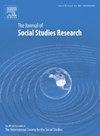“I think the comfort women are us”: National identity and affective historical empathy in students’ understanding of “comfort women” in South Korea
Abstract
This study investigates how students' national identity affects their historical understanding by mediating their use of affective historical empathy. The research focuses on the case of “comfort women” (women forced into sexual slavery for Japanese soldiers during WWII) in South Korea—a topic in which a strong nationalist narrative dominates social and educational discourses. I conducted semi-structured, task-based group interviews with 16 high school students in South Korea. In interviews, students' national identity mediated how they utilized four types of affective historical empathy: Students as ethnic Koreans cared more about “our” Korean comfort women over others; cared that Korean comfort women and others suffered from what “we” and “they” did as nations; cared for those women's voices from a humanitarian perspective beyond their ethnic and national boundaries; and cared to make social changes for those women and themselves as future citizens of their democratic nation. These findings help us understand how students' emotional attachment to “our” nation and its members can mediate their historical understanding through affective historical empathy as well as how affective historical empathy can motivate students to move beyond purely nationalistic concerns. This case study also stimulates reflection on historical empathy's implications for students' democratic civic participation.

 求助内容:
求助内容: 应助结果提醒方式:
应助结果提醒方式:


